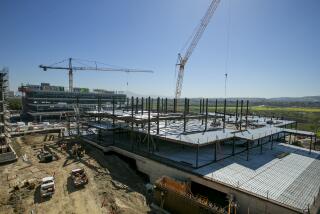UCI Medical Center OKd to Use External Heart Pump
UCI Medical Center has been granted permission to use a new type of temporary artificial heart, a plastic pump that would fit outside a heart patient’s body, hospital officials said Friday.
The U.S. Food and Drug Administration has approved use of the Acute Ventricular Assist Device (AVAD) at the hospital. The medical center in Orange becomes one of 20 hospitals in the country approved to use the pump and the only hospital in a five-county region including Orange, Los Angeles, Riverside, San Bernardino and Santa Barbara counties, hospital officials said.
Cardiologists said the center sought approval to use the artificial heart as part of the university hospital’s long-term plan to become recognized for major research and development of such artificial devices.
The device helps coronary patients by temporarily taking over work for an ailing heart. The pump and other working equipment of this artificial heart remain outside the body. Plastic tubes are the only intrusion to a person’s body. Those tubes connect a real heart to the plastic one, which takes over most of the work.
“The heart becomes happier (with AVAD support) because it has less work to do,” said Dr. Richard Ott, director of the Cardiac Transplantation Program at UCI Medical Center. He said the device will have many uses, including being a temporary heart for patients recovering from open-heart bypass surgery.
” . . . The device also can be used as a ‘bridge’ to assist the heart (of a critically ill coronary patient) until a donor heart is available,” Ott said. That is an important, life-saving asset, he said, because about 30% of heart transplant candidates die while waiting for a donor heart.
Elaine Beno, a spokeswoman for UCI Medical Center, said the pump device is an improvement over previous artificial hearts because its action more closely resembles that of the human body.
“The AVAD is pneumatically driven--a major advantage over centrifugal pumps now in use because it functions more like the body’s own physiology,” Beno said. “Thus, the AVAD does less damage to the blood and organs like the kidneys, allowing it to be used for extended periods.”
UCI Medical Center’s use of the “interim artificial heart” will be directed by Timothy Mills, who has a doctorate in bioengineering.
“The AVAD has the ability to allow the native heart to recover,” Mills said. “It will allow a heart to have a gradual recovery period, and the patient can then be weaned off the AVAD.”
Ott said he believes that UCI Medical Center was the first in the five-county area
to obtain federal approval for the new device “because this a major research university.” He also predicted that use of the AVAD will help them save many lives.
There are many cases, Ott said, where a person’s own heart can be saved if it is only given some rest.
“A heart is an amazing organ--it can resuscitate itself,” Ott said. “This device can allow a heart to recover function.”
It will be an expensive procedure, however.
Ott said the total cost for the machines, training and equipment is $129,000. Of that amount, $11,000 is the cost of a single ventricular-assist plastic pump. Human hearts have two ventricles, or chambers. If both ventricles need support, two of the plastic devices are used, Ott noted, and the cost would be $22,000.
“Every time we would use the equipment, it would cost (the patient) $11,000 per ventricle,” said Ott.
Ott said UCI Medical Center now plans to do its own experiments and further develop the “interim artificial heart” equipment.
“Our long-term goal is to make the university an acknowledged center for the application of these devices, and part and parcel to that is the development of our designs,” Ott said. “We very much have an interest in further development of this technology.”





